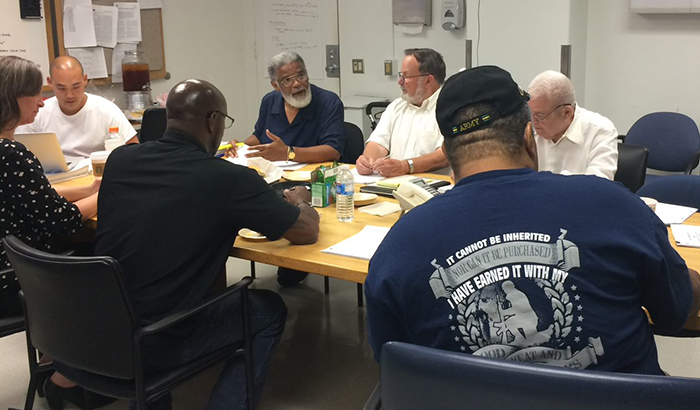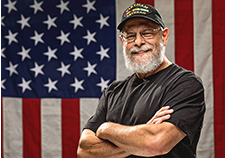Office of Research & Development |
 |


A Veterans Engagement Group meets at the Eastern Colorado Healthcare System in 2017. (Photo: VA Eastern Colorado Healthcare System)
July 7, 2020
Mike Richman
VA Research Communications
Engaging Veterans in planning and shaping VA research studies has gained momentum in recent years. The research community generally believes that doing so ensures that health research is more relevant and tailored to the experiences and medical needs of the Veteran population. Veteran input in health care research can increase the credibility of results and lead to higher-quality, more patient-centered care.
VA medical centers and research offices promote Veteran inclusion through the development of Veteran engagement groups (VEGs). In VEGs, former service members engage with researchers in meetings to review research proposals or projects.
A 2019 article in the Journal of Humanistic Psychology shares experiences, strategies, and lessons learned in implementing VEGs from liaisons who serve as a bridge between researchers and the Veterans in those groups. The findings are based on the recruitment and engagement of Veterans in the research process at six VA facilities: Denver; Houston; Hines, Illinois; Iowa City, Iowa; Portland, Oregon; and West Haven, Connecticut.
"With the backing of VA research leaders, VA medical centers began developing methods for incorporating the Veteran voice into studies more broadly."
Leah Wendleton of the VA Eastern Colorado Healthcare System was the lead author of the article. She belongs to the VA National Workgroup on Veteran Engagement and works to implement Veteran engagement in VA research.
In the article, Wendleton and her colleagues reviewed five steps that are important to engaging Veterans in the research process. They believe the steps depend on one another:
Dr. Molly Klote, director of the VA Office of Research Protections, Policy, and Education, is a proponent of Veteran engagement in all types of VA research. She’s pleased that Wendleton and her team used the term engagement, instead of enrollment, in the article.
“Engagement engenders relationship in my mind,” Klote says. “Engaging with Veterans is also about understanding what they want to see happen in research to support their needs. Many institutions, including VA, conduct focus groups to find out what is acceptable to Veterans in terms of contacting them, using their data in current and future studies, the readability of consent form language, and how much of an incentive to join a study is too much or not enough. Those targets change as our Veteran population changes.”

VA ear surgeon studies management of severe hearing loss in Veterans

Veteran disability payments led to fewer hospitalizations

Air Force Veteran among 10 new awardees in VA diversity, equity, and inclusion research program

VA researcher leads project to evaluate Veteran screening for malnutrition
Wendleton, who is also affiliated with the Rocky Mountain MIRECC (Mental Illness Research, Education, and Clinical Center) for Suicide Prevention, and a co-author of the article, Kelty Fehling of the Denver VA COIN (Center of Innovation for Veteran-Centered and Value-Driven Care), spoke to VA Research Currents.
VA Research Currents: What influenced you to focus your research on Veteran engagement?
Wendleton and Fehling: Our inspiration for pursuing greater Veteran engagement in VA is based on our work before we came to the agency. Many of us worked to engage communities in research using traditional community-based participatory research methods, whereby community members partner with researchers to carry out studies. In addition, the 2010 Patient Protection and Affordable Care Act created a new research mechanism called the Patient-Centered Outcomes Research Institute, which emphasized and promoted this type of work across the health research field.
We recognized the benefit of these types of community partnerships for ensuring that research methods, outcomes, and diffusion of research results were meaningful to the people the research is meant to impact. In 2013, this type of research engagement with Veterans was not widespread. But we recognized it was in line with VA’s mission and that it could only improve VA research projects. With the backing of VA research leaders, VA medical centers began developing methods for incorporating the Veteran voice into studies more broadly.
What types of ideas do Veterans normally present that help shape research?
The group of Veterans we work with at the Denver VA, for example, comes into every meeting and conversation with a laser focus on how the research projects being discussed will benefit Veterans. That’s their number one priority. Beyond that, their input and feedback varies by project. They may contribute ideas on how to improve patient education materials and provide suggestions for health outcomes and research questions that are important to them. They may even share ideas for what VA medical center a study should take place at to ensure Veteran participation.
Were you surprised by what you learned in the case studies?
We went into this type of work knowing there wouldn’t be a true “one-size-fits-all” model. That helped limit the number of surprises. The case studies illustrate how different VA research centers had to approach the creation and upkeep of these Veteran engagement groups differently based on the needs of local Veteran communities, VA medical centers, and research investigator groups. Flexibility is key in this type of work.
More institutional review boards at universities and federal agencies are recognizing patient engagement in study designs and have eased some of the regulatory barriers to doing this work. This work requires flexibility. So it’s great when VA can continue to think creatively about how to engage Veterans and to make it easier for researchers to do this type of work.
You note that making Veteran engagement a regular part of VA health services research will require “a cultural shift to one that embraces Veterans’ perspectives and results in a more collaborative partnership between VA leadership, researchers, and Veterans.” Is this shift taking place?
This shift is happening now. We were part of a group of researchers in VA’s Health Services Research and Development Service [HSR&D] who created a toolkit to assist VA medical centers and researchers in efforts to include Veterans and other stakeholders in the development, implementation, and dissemination of studies. HSR&D Centers of Innovation are also required to work with Veterans and incorporate their feedback in their research centers. To continue to normalize this type of work, we think it will be important for VA research fellows and trainees to engage with Veterans early in their careers. Once researchers widely see engagement with Veterans as a normal component of the research process, we will see more and more of this work.
Your article indicates that efforts to engage Veterans in VA research have been increasing in recent years. Is there a way to quantify this?
This would be hard to quantify accurately through hard numbers. We know research studies are increasingly including Veterans to help shape research questions, processes, and outcomes since there are now VEGs at research centers across the country. More research funders want to see that researchers are engaging with stakeholders in meaningful ways. We have seen many research studies start to establish their own ongoing VEGs that work even closer with researchers on projects as the research progresses.
Can Veteran recruitment and involvement be just as effective in studies that do not use the VEG process?
Our groups are all engaging with a lot of researchers. Once a strategy for recruitment or reenrollment is used by one researcher, other researchers often start incorporating the same feedback and strategies into their work. While recruitment and enrollment may improve by using VEGs, it’s normally not the only goal. Researchers are often getting feedback and guidance on ways to be clear and transparent about the purposes and processes of research in consent forms and when communicating about research. The Veterans make sure researchers are asking the right questions in the right ways and are not missing anything they should be asking about or looking at from a Veteran perspective. Together, the researchers and the Veterans ensure that Veterans involved in research always have access to related resources and clinical support as needed.
Existing Veteran engagement resources focus mainly on Veterans who receive care in the VA system. How do you think VA research can engage more Veterans who do not use VA health care? That cohort accounts for most of the Veteran population.
Branch out. Engage with communities outside of health care and show up often at events to reach out to Veterans. We often hear about a lack of trust in VA from Veterans being something that makes them hesitant to participate in research. We do everything we can to show we can be trusted and that we value the time and effort of Veterans. In our work, we make the Veterans’ voice the priority, and we make sure we are transparent about everything we are doing.
Army Veteran Sean McGrane has been involved in different stages of the VA research process.
McGrane has participated in two studies that were aimed at better understanding the impact of traumatic brain injury. He experienced a TBI in a 2005 roadside bombing in Iraq.
He’s also a member of the Veteran engagement group (VEG) for the Denver VA COIN (Center of Innovation for Veteran-Centered and Value-Driven Care) and the Rocky Mountain MIRECC (Mental Illness Research, Education, and Clinical Center) for Suicide Prevention. VEGs consist of Veterans who review and offer feedback on projects or proposals that is aimed at improving the research from a Veteran perspective (see main story).
Since becoming a part of the group late last year, McGrane has been in VEG meetings that have analyzed study proposals on treatments and research methods on Veterans and suicide prevention; on improving the physical and mental health of Vets through weight loss; and on treatment and outreach to homeless Veterans.
His passion for his role in the Veteran engagement group is palpable.
“To be on the advisory side on the other side of the table is really rewarding,” he says. “That’s because it’s easy as a Vet to get really frustrated that things aren’t happening faster and to not feel like yourself and to just want somebody to fix you and make things better. So it’s been eye-opening for me to be on the other side, to see these research projects that are in the funnel, and to know that for every research project that comes before us on the board, there’s still a ton that don’t because we’re so limited in our capacity. That give you hope and makes you feel more positive again.”
Thus far, McGrane has taken part in seven monthly board meetings. At each one, a different researcher has presented a study proposal to his 10-member VEG, a diverse group with Veterans from different branches of the military, women, officers, post-9-11 Vets, and Vietnam Vets. Most of the researchers who have presented have been from the Rocky Mountain MIRECC and the Denver VA COIN. Some have had affiliation with the Puget Sound VA in Washington state.
In the meetings, McGrane has occasionally observed a knowledge gap between the researchers and the Veteran community they are trying to serve. In the study proposal about Veterans and weight loss, for example, the VEG mentioned points that the research team possibly hadn’t thought about, McGrane says. The team, he notes, focused much of its proposal on civilian research programs on weight loss, with the goal of adapting those ideas to the Veteran community “without really thinking about why Veterans are overweight.”
“It’s usually a mental or physical problem that causes a Veteran’s overweight obesity problem,” he says. “What were [the researchers] doing to address that physical or mental limitation before they threw this Vet into a physical workout program? The light bulb went off: `Oh, we didn’t think about that.’ They may need to have occupational therapists who can help adapt the exercises or mental health specialists on call to help work through some of the mental problems before a Veteran can go through that program.”
To McGrane, it’s “super-important on multiple levels” for Veterans to give feedback to the researchers because, for one, taxpayers are funding the research if it gets approved.
“Just by the researcher talking to us for an hour or two, we can really help steer the research in a productive way that can save a lot of money and help make the study more effective,” he says. “We can close gaps that they weren’t aware of. We can give them a lot of different perspectives before they ever actually engage with Veterans in the study process. Sometimes, the way these researchers are talking about engaging with Vets can really shut Veterans down and make it harder to get the information they’re trying to get. We can give them a lot of valuable input to make their study more successful. We’re the voice of the Veteran to them to make sure they’ve considered things before they engage Veterans.”
--- Mike Richman
VA Research Currents archives || Sign up for VA Research updates